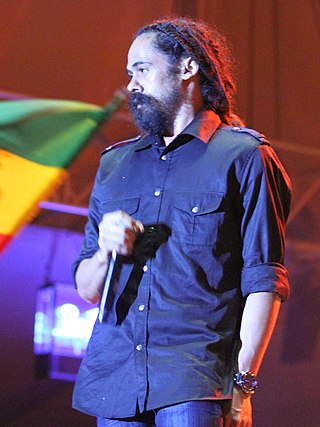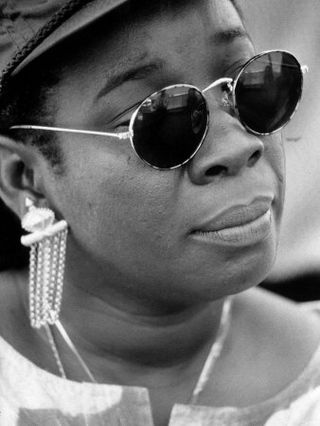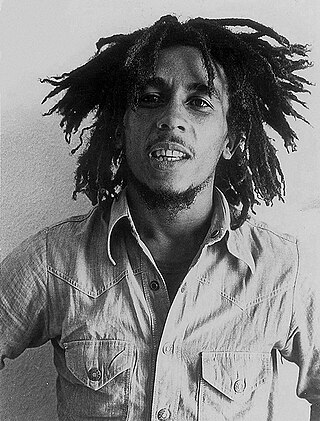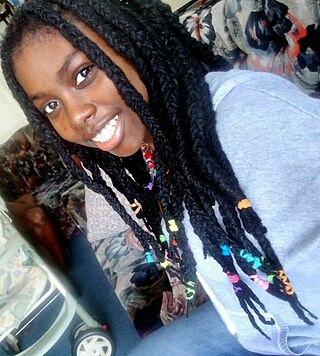
David Nesta "Ziggy" Marley is a Jamaican reggae musician. He is the son of reggae icon Bob Marley and Rita Marley. He led the family band Ziggy Marley and the Melody Makers until 2002, with whom he released eight studio albums. After the disbandment, Ziggy launched a successful solo career by having released eight solo studio albums on his own record company, Tuff Gong Worldwide. Ziggy continues his father’s heritage to record and self-release all of his music. Marley is an eight-time Grammy Award winner and a Daytime Emmy Award recipient.

Catch a Fire is the fifth studio album by the reggae band The Wailers, released in April 1973. It was their first album released by Island Records. After finishing a UK tour with Johnny Nash, they had started laying down tracks for JAD Records when a disputed CBS contract with Danny Sims created tensions. The band did not have enough money to return to Jamaica, so their road manager Brent Clarke approached producer Chris Blackwell, who agreed to advance The Wailers money for an album. They instead used this money to pay their fares back home, where they completed the recordings that constitute Catch a Fire. The album has nine songs, two of which were written and composed by Peter Tosh; the remaining seven were by Bob Marley. While Bunny Wailer is not credited as a writer, the group's writing style was a collective process. For the immediate follow-up album, Burnin', also released in 1973, he contributed four songs. After Marley returned with the tapes to London, Blackwell reworked the tracks at Island Studios, with contributions by Muscle Shoals session musician Wayne Perkins, who played guitar on three overdubbed tracks. The album had a limited original release under the name The Wailers in a sleeve depicting a Zippo lighter, designed by graphic artists Rod Dyer and Bob Weiner; subsequent releases had an alternative cover designed by John Bonis, featuring an Esther Anderson portrait of Marley smoking a "spliff", and crediting the band as Bob Marley and the Wailers.
Jamaican culture consists of the religion, norms, values, and lifestyle that define the people of Jamaica. The culture is mixed, with an ethnically diverse society, stemming from a history of inhabitants beginning with the original inhabitants of Jamaica. The Spaniards originally brought slavery to Jamaica. Then they were overthrown by the English. Jamaica later gained emancipation on 1 August 1838, and independence from the British on 6 August 1962. Black slaves became the dominant cultural force as they suffered and resisted the harsh conditions of forced labour. After the abolition of slavery, Chinese and Indian migrants were transported to the island as indentured workers, bringing with them ideas from their country.

Bob Marley and the Wailers were a Jamaican ska, rocksteady and reggae band. The founding members, in 1963, were Bob Marley, Peter Tosh, and Bunny Wailer.

Damian Robert Nesta "Jr. Gong" Marley is a Jamaican DJ, singer, lyricist and rapper. He is the recipient of four Grammy Awards.

Alfarita Constantia Marley is a Cuban-born Jamaican singer, songwriter and entrepreneur. She is the widow of reggae legend Bob Marley. Along with Marcia Griffiths and Judy Mowatt, Marley was a member of the reggae vocal group the I Threes, the backing vocalists for Bob Marley and the Wailers.
Grounation Day is an important Rastafari holy day, second only to Coronation Day. It is celebrated in honour of Haile Selassie's 1966 visit to Jamaica.
Cynthia Jean Cameron Breakspeare is a Canadian-Jamaican jazz singer, musician and beauty queen. Breakspeare was crowned Miss World 1976. Breakspeare is the mother of reggae musician Damian Marley, through her relationship with Bob Marley, who remained married to Rita Marley until his death. Marley is said to have written the songs "Turn Your Lights Down Low" and "Waiting in Vain" about her.
Reggae Sunsplash is a reggae music festival first staged in 1978 in northern Jamaica. In 1985, it expanded with the addition of an international touring festival. The festival ran annually until 1996, with a final event in 1998, before it was revived in 2006. The festival returned for a virtual staging in 2020 produced by Tyrone Wilson, Randy McLaren, and Debbie Bissoon.
Nasio Fontaine, also known simply as Nasio, is a reggae artist from the Commonwealth of Dominica.
Carolyn Cooper CD is a Jamaican author, essayist and literary scholar. She is a former professor of Literary and Cultural Studies at the University of the West Indies, Mona, Jamaica. From 1975 to 1980, she was an assistant professor at Atlantic Union College in South Lancaster, Massachusetts. In 1980, she was appointed as a lecturer in the Department of Literatures in English at the University of the West Indies (UWI), where she continued to work until her retirement as a professor in 2017. Also a newspaper journalist, Cooper writes a weekly column for the Sunday Gleaner.

Robert Nesta Marley was a Jamaican reggae singer, guitarist, and songwriter. Considered one of the pioneers of the genre, Marley fused elements of reggae, ska, and rocksteady in his music and was renowned for his distinctive vocal and songwriting style. Marley's contribution to music increased the visibility of Jamaican music worldwide and made him a global figure in popular culture. Over the course of his career, Marley became known as a Rastafarian icon, and he infused his music with a sense of spirituality. He is also considered a global symbol of Jamaican music and culture and identity, and was controversial in his outspoken support for democratic social reforms. He also supported legalisation of cannabis, and advocated for Pan-Africanism. In 1976, Marley survived an assassination attempt in his home, which was believed to be politically motivated.

The Jamaica women's national football team, nicknamed the "Reggae Girlz", represents Jamaica in international women's football. They are one of the top women's national football teams in the Caribbean region along with Trinidad and Tobago and Haiti. In 2008, the team was disbanded after it failed to get out of the group stage of Olympic Qualifying, which notably featured the United States and Mexico. The program was restarted in 2014 after a nearly six-year hiatus, finishing second at the 2014 Women's Caribbean Cup after losing 1–0 against Trinidad and Tobago in the final. The team is backed by ambassador Cedella Marley, the daughter of Bob Marley; she helps raise awareness for the team, encourages development, and provides for it financially. Jamaica qualified for the FIFA Women's World Cup for the first time in 2019, but the team was eliminated after losing all its matches in the group stage. At the 2023 World Cup Jamaica made the Round of 16 for the first time, after holding both France and Brazil to 0–0 draws and winning their first ever match at a World Cup against Panama 1–0.

Choc'late Allen is a child activist who arose to national awareness in early 2007 by engaging in a 5-day fast in an effort to promote the concept of taking personal responsibility for individual thoughts and actions, in order to treat with social issues plaguing Trinidad and Tobago. During her fasting process, the young CEO of Caribbean Vizion, received visits from many citizens and dignitaries, including then-opposition leader Kamla Persad-Bissessar and then-Prime Minister Patrick Manning.
Nadine Sutherland is a Jamaican reggae singer whose early career was nurtured by Bob Marley. She went on to become a successful dancehall artist in the 1990s.
Carlene Davis is a Jamaican gospel and reggae singer active since the 1970s. Successful since the early 1980s as a reggae artist, she survived cancer in the mid-1990s, after which she dedicated her career to gospel music. She has released over ten albums.

Gian Godoy RIBA Part 1 is a filmmaker, architectural designer and artist.

Winston Hubert McIntosh, OM, professionally known as Peter Tosh, was a Jamaican reggae musician. Along with Bob Marley and Bunny Wailer, he was one of the core members of the band the Wailers (1963–1976), after which he established himself as a successful solo artist and a promoter of Rastafari. He was murdered in 1987 during a home invasion.
Royal tours of Jamaica by Jamaica's royal family have been taking place since the 20th century. Elizabeth II, Queen of Jamaica, visited the island six times; in 1953, 1966, 1975, 1983, 1994, and 2002.










